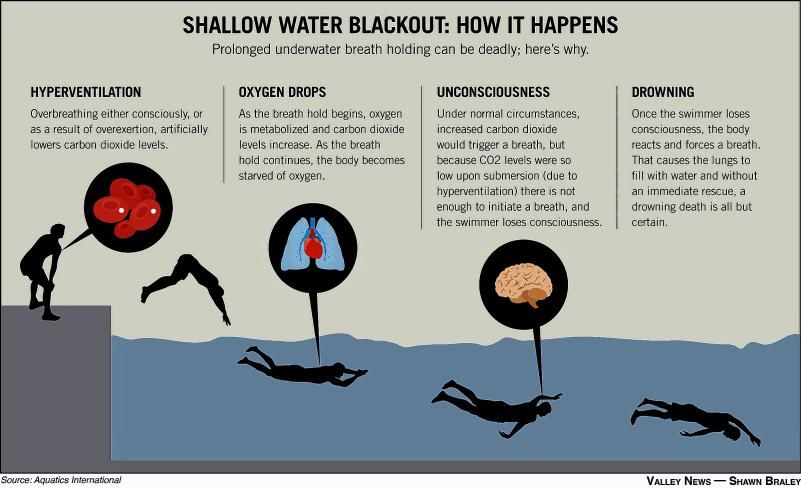
Many parents have never heard of shallow water blackout (SWD). That is why I want to take a few minutes and warn parents about this problem. When it occurs, it is often fatal. Please take a few minutes, read this short article, make yourself aware of this problem that can occur while swimming, and warn your children about it.
Unsuspected Fainting That Occurs Without Warning
Shallow water blackout (it is also called hypoxic blackout) is basically a faint that occurs underwater. It’s caused by a lack of oxygen to the brain. Surprisingly, it often effects well trained swimmers such as spearfisherman, competitive swimmers, and even Navy Seals.
SWD can occur without warning. It often occurs when the swimmer has had repetitive, prolonged, swimming laps while holding their breath. Surprisingly, what initiates the human body to take another breath is not the lack of oxygen (O2), but, actually the existence of carbon dioxide (CO2). If the swimmer has been hyperventilating, the carbon dioxide level and oxygen level go down. Suddenly, the human body faints.
Sometimes, the person who has fainted will take in water into the lungs and die. Others, will just suffocate and die. Death occurs rapidly because the human body at this point has been low on oxygen for some period of time.
National statistics are not kept on this phenomenon. The number of people that die from it are probably not huge, but it is a real problem. It’s known that at least four highly qualified swimmers died from breath-holding incidents in New York City between 1988 and 2011.
Recently, these parents lost their 21-year old son to shallow water blackout. He was a college senior and a superb swimmer. Watch this video:
So, what exactly do you tell your children to prevent this problem.? Here are a few things to tell and remind your children:
1. Educate yourself and your children. Be aware of the problem.
2. Never swim alone.
3. Never practice hyperventilation.
4. Never practice prolonged breath-holding in the pool.
5. If you swim a long distance underwater, do it only one time. Then, get out and rest.
Trust What You Learn from Our Instructor’s at Life Saver Survivor Swim School
I have been teaching swim instruction for many years at Life Saver Survivor Swim School. The safety of my student’s is so important. If you have children that might need some help with their aquatic skills, please don’t hesitate to call me, Bonnie. I can be reached by dialing (832) 366-3008. Or, you can email me.

